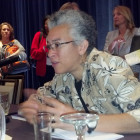
Engaging the Families of Youth in Custody: An Essential Goal for Juvenile Justice Practitioners
|
With a new year upon us, now is the ideal time for juvenile justice practitioners to reflect upon their work and set goals for the months to come.
Juvenile Justice Information Exchange (https://jjie.org/tag/families/)

With a new year upon us, now is the ideal time for juvenile justice practitioners to reflect upon their work and set goals for the months to come.

Every day, nearly 50,000 children are forced to spend the night away from their families because of their involvement in the juvenile justice system, according to a new report. It’s not as if these youth have no one to care for them. Families of young detainees care deeply about their children, but often feel helpless when their children get into trouble -- especially in the face of high adult incarceration rates, zero-tolerance school policies and reduced social services, which can make it difficult for families to offer support. Add to this a juvenile court system that practically shuts out family members from receiving or offering input, and the feelings of frustration and helplessness multiply. These are the findings of Families Unlocking Futures: Solutions to the Crisis in Juvenile Justice, a report released Monday that offers a blueprint for reforms that involve family members at every step when a child gets into trouble, whether at school or in the juvenile justice system.

After years of focusing on the safety of children, the nation's juvenile courts are shifting to a more holistic approach that takes into account the emotional, social and academic well-being of at-risk youth. That effort, which has been underway for at least a year, will be showcased Thursday during a webcast moderated by David Kelly, head of the federal Department of Health and Human Services child protection programs.
The crux of the webcast, which starts at 2 p.m. EDT, is to explore how the courts, which are so used to patrolling a child's safety, can attend to the mental, social and physical "well-being" of a child. More precisely, the effort will vet 14 specific measurements that were developed by a committee last summer to ensure the courts are meeting every need of a child - not simply plucking them from dangerous homes or removing risky parents from their lives. About 400 people, many of them judges, attorneys and court administrators, are expected to tune into the webcast. Also participating will be Gene Flango and Nora Sydow of the National Resource Center and National Center for State Courts; Evan Klain, who is director of child welfare for the ABA's Center on Children and the Law; Associate Judge Robert Hofmann of Mason County, Texas; and Sandra Moore, head of Pennsylvania's state office of Children and Families in the Court.

Jeannette Bocanegra, a community organizer from New York City, told a gathering of juvenile justice system practitioners and advocates in Houston last week that as a mom with a child who was incarcerated, “This system made me feel like I was a dysfunctional parent, a bad parent … without realizing I raised six other children who never went into the system.”
Now she and other members of Justice for Families, an advocacy group, are out to prove that, in her words, “We are not dysfunctional … the system is dysfunctional.”
Liane Rozzell, another parent on the panel, said afterwards, “We don’t have 24-hour remote control over our children.”
During the panel discussion, Rozzell said when her son was first put into detention she thought it might be a good thing, it would teach him a lesson. But she did not realize how negatively he would be affected by the experience. She also recalled being in a meeting where a teacher from a correctional institution off handedly mentioned sending kids to “an inherently violent place like a juvenile correctional center.”
After hearing that phrase, Rozzell said, “I was just stunned that we can just casually talk about sending our children to an inherently violent place.”
In June, Justice for Families will be releasing an in-depth report, underwritten by the Annie E. Casey Foundation. The report includes results of a survey of 1,000 family members who have had children incarcerated and examines how families of the incarcerated are portrayed by the media. Justice for Families co-director Grace Bauer says family involvement and networking is necessary because, “No one knows what it is like to struggle with a child in the system better than another parent.”
However, according to Bauer, early findings from the report reveal, “Families are not consulted.

The W.K. Kellogg Foundation puts its focus on vulnerable kids and their families. The organization this grant supports should surround these kids with integrated programs that address their needs. The goal of the Kellogg Foundation is to help communities stand up for children by focusing on educating kids, keeping them healthy and secure, as well as working toward racial equity and civic engagement. This grant has a rolling deadline.